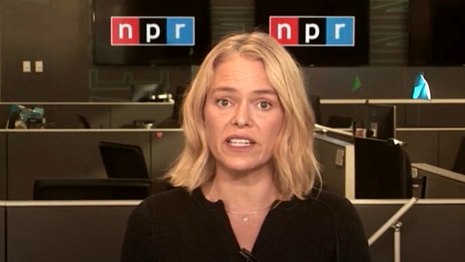 Status newsletter founder and former CNN media reporter Oliver Darcy interviewed NPR chief executive Katherine Maher on Sunday about the awfulness of what she saw (at least through Darcy’s paraphrasing) as a decision that was “politically motivated, structurally damaging, and devastating to rural communities where public broadcasting is often the last reliable source of local journalism….”
Status newsletter founder and former CNN media reporter Oliver Darcy interviewed NPR chief executive Katherine Maher on Sunday about the awfulness of what she saw (at least through Darcy’s paraphrasing) as a decision that was “politically motivated, structurally damaging, and devastating to rural communities where public broadcasting is often the last reliable source of local journalism….”
Oliver Darcy: How big of a financial hit is this for NPR and the public media ecosystem overall? Can you quantify it in practical terms?
Maher ran through her familiar exaggerations, with the now-tiresome focus on Alaska as a sprawling, rural, vulnerable spot.
Katherine Maher: ….The loss of funding may make it impossible for local stations in places like rural Alaska and Appalachia to continue to operate—stations that receive as much as 70% of their budget from federal funds….
Asked about accusations of liberal bias, Maher made a silly statement about public media covering “soybean farmers” and then suggested Republicans were racist who only wanted white perspectives aired. (Hot Air’s David Strom pointed out that NPR’s audience is overwhelmingly white. Is NPR racist too?)
Darcy: Republicans have argued that public media has a liberal bias and pushes “woke” ideologies. What’s your response?
Maher: We can have real, substantive policy debates about federal funding for public media. I recognize that’s a matter of legitimate political disagreement—how big the government should be, or what the government should and shouldn’t fund. I’ll come armed to that debate with binders full of constituent testimonials, reams of economic analyses, and plenty of arguments about the quantitative and qualitative value of public information. But that’s not the debate we’re having here.
This argument about public media being “biased” is a stalking horse. We report on soybean farmers and LGBTQ activism. We report on coal miners and eco-warriors. We report on local manufacturing and international trade organizations. All of these are legitimate expressions of American discourse, all are reflections of the range of American experiences. Having non-white voices and perspectives on air does not make us woke. Covering the existence of disagreement and difference in our country does not make us biased. It makes us reflective of the complex, diverse nation we serve.
At least Maher is now defending NPR’s actual content (albeit badly), as opposed to her previous stance of pretending she has never heard any bias, a stance which suggested she had never actually listened to NPR. Then again, judging by her X postings before she joined NPR, Maher is so far to the left she may not hear anything out of kilter for her on National Public Radio.
Maher is also way off on what kind of story “public media” actually covers. A Nexis search indicates that over the last five years NPR’s sister public media outlet, the PBS News Hour (NPR transcripts are sparse on Nexis) has mentioned "soybean" in 12 stories.
By contrast, the phrase “LGBTQ” came up in 259 stories (including many multiple mentions), and “LGBT” occurred in 36 others. And keep in mind that those alphabet phrases are in themselves a sign of left-wing moorings, meaning PBS adopted the language of leftist activists in its own supposedly objective journalism. Meanwhile, "soybean" has no ideological content.
Darcy: How do you think this will affect the information ecosystem in places where NPR member stations are often the only source of local news?
Maher offered her usual guff about “news deserts” in America, even making the unlikely suggestion that PBS and NPR boost bond ratings in American communities.
Maher: 20% of Americans live in a news desert—community without any source of local news other than public media. The ongoing collapse of the local news ecosystem in the United States has been catastrophically bad for our democracy….[public radio] helps reverse some of the negative effects of news deserts—in addition to better civic outcomes, local news such as public media correlates with other positive effects, such as better municipal bond ratings….




